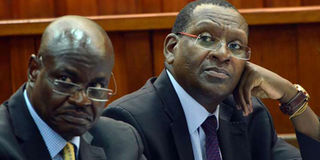Court to rule on case challenging hiring of Chief Justice

Lawyers James Oduol (left) and Njoroge Regeru, representing the Judicial Service Commission and Attorney-General Githu Muigai respectively, at the High Court in Mombasa on August 23, 2016 where Justice George Odunga heard a petition seeking to stop the hiring of the next Chief Justice and deputy Chief Justice. PHOTO | KEVIN ODIT | NATION MEDIA GROUP
What you need to know:
- Trusted Society of Human Rights Alliance, Mr Magina, Prof Ghai and Mohochi are challenging the process of recruiting the next CJ, DCJ and a judge of the Supreme Court.
- Mr Regeru said JSC mandate is derived from the Constitution and that the petitioners are ‘gate-crashing’ hence they should be stopped.
- Through their lawyers, the petitioners argued that JSC engaged in legal and procedural violations during the process of shortlisting.
The Judicial Service Commission has said the case challenging the hiring of the Chief Justice, deputy Chief Justice and a Supreme Court judge as an attempt to impose the individuals to be hired.
Through lawyers Njoroge Regeru and Ochieng Odul, the commission said the proceedings in court represent attempts at hijacking the recruitment with a view to determining the people to be appointed to the three positions.
Mr Reguru described the hiring process as sensitive, saying there will be very many vested interests.
“There is a good reason why the commission was insulated from interference,” said Mr Regeru adding that JSC is independent and not subject to control of any person but to the law.
Trusted Society of Human Rights Alliance, Mr Arnold Magina, Mr Yash Pal Ghai and Samwel Mohochi are challenging the process of recruiting the next CJ, DCJ and a judge of the Supreme Court.
Mr Regeru said JSC mandate is derived from the Constitution and that the petitioners are "gate-crashing" hence they should be stopped.
Further, he submitted that it is incumbent upon JSC as a recruiting agency to devise objectives and reasonable ways to assist in determining which applicant passes the integrity test.
“The higher office is sensitive. There is no need to have a learned judge who has financial issues,” said Mr Regeru, adding that the commission derived ‘tools’ to assess among others the moral character and integrity of the applicants.
Mr Regeru said the ‘tools’ are objective and reasonable yardsticks which can be evaluated and reviewed and that the requirements are not the creation of JSC.
The lawyer argued that the petitioners have not offered any alternative methods on how integrity of individuals can be gauged.
Furthermore, Mr Oduol said that the right to know why some applicants were not shortlisted belongs to those who applied for the positions and not the public.
He told the court that the disclosure of information is not an absolute right and that mutuality of confidence is recognized by law.
Mr Oduol said minutes of the JSC meeting in relation to shortlisting of applicants are confidential.
“The mere fact that they were not disclosed is not bad practice, it is something accepted internationally,” said Mr Oduol.
Through their lawyers, the petitioners argued that JSC engaged in legal and procedural violations during the process of shortlisting.
They argued that the violations can only be rectified by invalidating the shortlisting process.
“The applicants have made a case. JSC got it wrong. Quash the process and allow it to start afresh,” said lawyer Elisha Ongoya for one of the petitioners.
Justice Odunga, who was sitting at the High Court in Mombasa as a result of the ongoing judges’ colloquium at the coastal city, will deliver his ruling on Monday in Nairobi.





